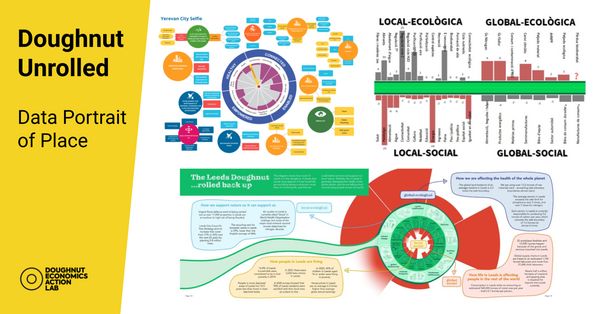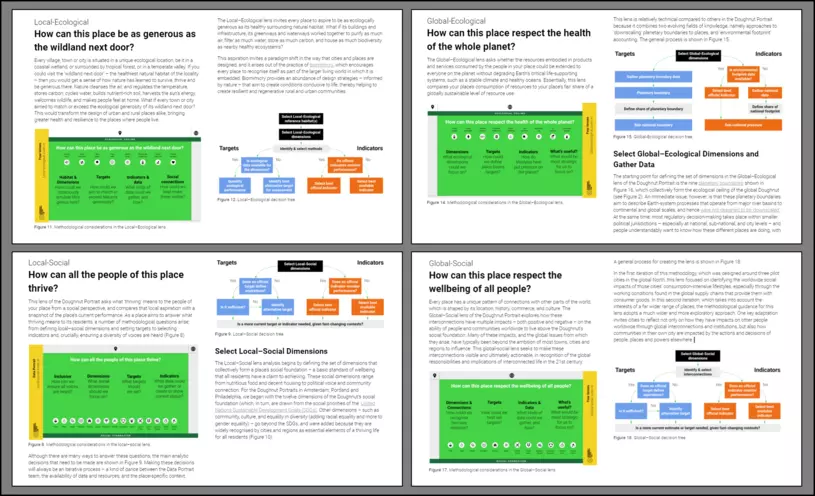
Doughnut Unrolled: Data Portrait of Place
A handbook of approaches for collecting targets and indicators across each of the four lenses for your place

Version 2.2 (January 2024)
📢 Now translated into French, Spanish, German and Brazilian Portuguese
* Cet outil est également disponible en français comme Google Doc ou comme PDF (et avec une feuille de calcul supplémentaire) *
* Esta herramienta también está disponible en español como Google Doc o como PDF (y con hoja de cálculo complementaria). *
* Dieses Tool ist auch auf Deutsch als Google Doc oder als PDF (und mit unterstützender Tabelle) verfügbar. *
* Esta ferramenta também está disponível em português como Google Doc ou como PDF (e com planilha suplementar). *
Overview
The goal of the Doughnut is to meet the needs of all people within the means of the living planet, but what does this mean for the neighbourhoods, cities, districts or nations where we live?
To help explore this question, DEAL has created a set of Doughnut Unrolled tools that unroll the Doughnut into four 'lenses' that consider the interplay between local aspirations and global responsibilities in your place – both socially and ecologically – and identify possible entry-points for transformative action.
This tool - Data Portrait of Place - is a handbook of approaches and useful resources for collecting locally relevant, data-led targets and indicators to create a holistic snapshot or a 'portrait' of your place's performance across each of the four lenses.
For an overview, watch the 18-min video with Andrew Fanning, DEAL's Research & Data Analysis Lead, introducing the Data Portrait of Place tool (recorded in July 2023 as part of this series of videos presenting Doughnut Economics concepts and practice). You can also access his presentation slides online using Google slides, or download the PowerPoint presentation.
The Data Portrait of Place handbook is available as a Google Doc or as a PDF (also available to download below, with accompanying Supplementary spreadsheet).
Why use this tool?
The Data Portrait of Place handbook provides guidance and useful resources for you to create a holistic data-led snapshot of what it means for your place to thrive while helping to bring humanity into the Doughnut.

It invites you to collect and compare desired outcomes versus current performance of your place using available data, offering a 'portrait' to discuss complex issues, which can keep evolving as more data is made available over time. For a collection of useful examples and results from the growing number of places that have already begun using the Data Portrait as an input to transformative action, see the accompanying Data Portraits in Action tool.
DEAL encourages you to use this data-led tool together with the Community Portrait of Place tool, which provides a complementary set of participatory workshop materials that can be used to invite the people of your place to share their knowledge, ideas, lived-experience and aspirations. Together, these tools draw upon both data and other diverse contributions to build a rich, multi-layered and holistic portrait of your place.
Important note: If you wish to use these tools as part of your consultancy or professional advisory services for others, then we require that you follow DEAL's policy for consultancies and professional advisors.
Feedback
Healthy living systems rely on good feedback loops and we invite your comments, reflections and suggestion from using this tool to help us iterate and evolve for future versions.
You can do this in three ways:
- Leave a comment in the section below called Join the conversation. The benefit of this approach is that everyone can see and benefit from what you share.
- Share detailed comments and suggestions in this dedicated Data Portrait of Place online collaborative feedback document.
- Contact the DEAL Team directly via the contact form, choosing the category 'Tools and Stories'.
Acknowledgements
The Doughnut Unrolled methodology was conceptualised by Kate Raworth of Doughnut Economics Action Lab and Janine Benyus of Biomimicry 3.8, and this methodological handbook was written by Andrew Fanning, Kate Raworth, Olya Krestyaninova, and Fredrik Eriksson, with valuable contributions from Rob Shorter, Leonora Grcheva, and Ruurd Priester from Doughnut Economics Action Lab. We are so very grateful to the many, diverse contributors to this tool and earlier versions. Please see the extended acknowledgements section within the handbook for additional details.
Share
Attachments
Doughnut Unrolled - Data Portrait of Place_v2.pdf
Creating-City-Portraits-SuppInfo.xlsx
Doughnut Unrolled - Data Portrait of Place_v2 (translated)-en-de.pdf
Doughnut Unrolled - Data Portrait of Place_v2 (translated)-en-fr.pdf
Creating-City-Portraits-SuppInfo.xlsx (translated)-en-fr-T-C.xlsx
Doughnut Unrolled - Data Portrait of Place_v2 (translated)-en-es.pdf
Creating-City-Portraits-SuppInfo.xlsx (translated)-en-es-.xlsx
Creating-City-Portraits-SuppInfo.xlsx (translated)-en-de.xlsx
Doughnut Unrolled - Data Portrait of Place_v2 (translated)-en-pt_br.pdf
Creating-City-Portraits-SuppInfo.xlsx (translated)-en-pt_br.xlsx
Share
-
Story

Neighbourhood Doughnut Portrait Launch
We're excited to introduce you to the first Neighbourhood Doughnut Portrait, painted by many people together in Ladywood
-
Story

Launching our Data Portrait as an exhibition
A platform for lots of conversations with people and expanding our network in Minato Ward.
-
Story

Doughnut Data Portraits in global South contexts
A co-creative process to reflect global South priorities and interests
-
Story

Glasgow and Barcelona share their Data Portraits
As part of a peer-to-peer gathering organised by DEAL, two research teams shared their evolving Data Portraits
-
Story

Prosperity indicators & the Doughnut portrait
Research question "How does the Doughnut portrait differ from previous prosperity indicator initiatives (if at all)?"
-
Story

Transforming places with the Doughnut - webinar 2
Watch the recording of two local governments working with Doughnut Economics in Brussels, Belgium and Nanaimo, Canada
-
Story

Transforming places with DE - webinar 1
Hearing from community-led initiatives in Leeds, UK and Melbourne, Australia
-
Member


Nathanael Card
Westhampton, Massachusetts, United States
BFA Theatre Arts MSc Ecological Design I learned the benefits of designing for circularity as a scenic designer-builder for small non-profit theaters (a previous career). My masters education taught me how to plan and design landscape in partnership with Nature. Now I'm here, ready to grow these principles into abundance for my community.
-
Member


Joel Petterson
Oxfordshire, England, United Kingdom
Hi, I've have recently completed my MSc Ecological Economics in Leeds. Since then I have been the Oxfordshire Doughnut Project Data Lead across the Four Lenses for the Preliminary Data Portrait: • Global Ecological Lens: based on planetary boundaries model, downscaling data to county or regional levels and applying and improving on best practice methodologies. • Global Social: designed a data methodology applying material footprinting data to Global Social dimensions (aligned with Sustainable Development Goals) to build a coherent narrative around local consumption and global social impact. • Local Social and Ecological: supervising and producing calculations across all dimensions and their visualisations. Looking forward to see where this doughnut goes and what opportunities for engagement arise from it!
-
Member


Lilian Marino
London, Greater London, England, United Kingdom
Bow - East London
-
Member


Natasha Williams
N15, Haringey, London, Greater London, England, United Kingdom
-
Member

Karin De Poortere Rivera
Bogotá D.C., Bogotá, 110131, Colombia
Architect and Urban Planner working on Territorial strategies
-
Member


Kyungmin Lee
Suji-gu, Yongin-si, Gyeonggi-do, South Korea
Co-Founder of Y-Donut (Yongin Doughnut Economics Coalition) and an active member of Neutinamu Makers and Supunro Cooperative at Neutinamu Library. PhD in Public Administration, Senior Researcher at the Institute of Governmental Studies at Korea University. Research focuses on integrating Doughnut Economics into grassroots policymaking to foster regenerative and redistributive communities.
-
Member


Russell Whittington
Asturias, Spain
I'm a father and secondary school teacher, and I'm looking to apply what the people at are discovering to my local community. I live in a rural part of the world, and the changes our farming community has seen over the past decade have been pretty alarming. With that in mind, I would like to make connections and build on some ideas with others on this platform. I am the furthest things from an expert, which is why I'm turning to you at the DEAL community to help. Primarily, I'd like to focus on initiatives, and projects, with the goal of improving the in these areas, in local communities with the aim of building in our . Bigger picture projects would be something like , or making local communities more energy independent; also, improving to go beyond memorization but actually apply and synthesize what we're learning to improve the our lives and the lives of others. Lastly, I would also like to think about , and bring in the older and wiser members of a community to advise, plan and implement ideas and strategies that will improve the lives of the younger generations, and those to come. I believe this can a lot of this can be done by working with . I am also aware that this is not easy, and will require a away from perpetual that is mostly individualistic and towards a richer, more world that is more community-focused. Thanks for reading this far, and please get in touch.
-
Member


Sean Manley
Ireland


